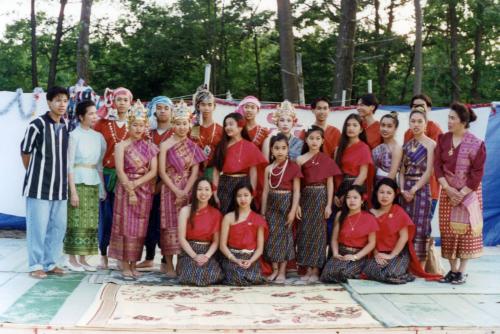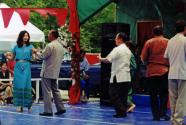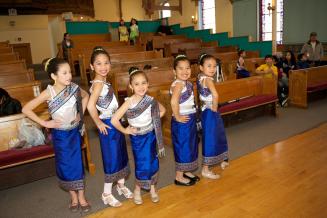SNEAP Year 1 and 2 Presentations: Lao Traditional Dance
SubjectPortrait of
Manola Sidara
(Laotian)
Date1998-2000
Mediumphotographic prints
ClassificationsGraphics
Credit LineConnecticut Cultural Heritage Arts Program collections
CopyrightIn Copyright
Object number2015.196.404.1-.22
DescriptionPhotographs from a required public presentation of the Years 1 and 2 Southern New England Apprenticeship Program team in Lao traditional dance with teaching artist Manola Sidara sharing skills with apprentices Ammala Doungsavanh, Lakitta Chatharangsy, and Pousady Chatharangsy from Rhode Island.
The event took place at the Lao New Year Celebration at the Buddhist Temple in Woonsocket, Rhode Island and featured performances by Manola Sidara and Ammala Doungsavanh and their young dance students.
2015.196.404.1: Image of a group of dancers wearing traditional Lao folk costume for a performance of what they learned during the apprenticeship program.
2015.196.404.2-.3: Images of a group of Lao dancers wearing traditional folk costume for a performance of what they learned during the apprenticeship program.
2015.196.404.4: Image of backstage preparations for the apprenticeship program event.
2015.196.404.5: Image of backstage preparations for the apprenticeship program event. Manola Sidara is dressing a young dancer.
2015.196.404.6: Image of Manola Sidara announcing the performance onstage.
2015.196.404.7-.8: Images of the teachers involved in the apprenticeship program in Lao dance. Those pictured include: “Pousady’s sister/Ammala’s mother, Ammala, and Manola Sidara.”
2015.196.404.9: Image of Sounalee, a very popular Thai singer, who was visiting, performing onstage.
2015.196.404.10: Image of Manola Sidara and other teachers receiving accolades and flowers onstage.
2015.196.404.11: Image of Manola Sidara and others onstage in a Lao social dance.
2015.196.404.12: Image of Lao dancers and audience members in a social dance.
2015.196.404.13-.16: Images of the older dance group performing onstage.
2015.196.404.17-.22: Images of the younger dance group performing Lao folk dance and classical dance onstage.
NotesSubject Note: The Southern New England Traditional Arts Apprenticeship Program is a CCHAP initiative since 1997 that fosters the sharing of community-based traditional (folk) artistic skills through the apprenticeship learning model of regular, intensive, one-on-one teaching by a skilled mentor artist to a student/apprentice. The program pairs teaching artists from Rhode Island, Massachusetts, or Connecticut with apprentices from one of the other states, as a way to knit together members of the same community or group across state lines. Teaching and learning traditional arts help to sustain cultural expressions that are central to a community, while also strengthening festivals, arts activities and events when mentor/apprentice artists perform or demonstrate results of their cooperative learning to public audiences. The Connecticut Cultural Heritage Arts Program at the Connecticut Historical Society manages the program in collaboration with the Folk Arts Program at the Massachusetts Cultural Council and independent folklorist Winifred Lambrecht who has a deep knowledge of the folk arts landscape of Rhode Island. Primary funding for the program comes from the National Endowment for the Arts, with support also from the Connecticut Commission on the Arts, the Institute for Community Research, and the Connecticut Historical Society.The event took place at the Lao New Year Celebration at the Buddhist Temple in Woonsocket, Rhode Island and featured performances by Manola Sidara and Ammala Doungsavanh and their young dance students.
2015.196.404.1: Image of a group of dancers wearing traditional Lao folk costume for a performance of what they learned during the apprenticeship program.
2015.196.404.2-.3: Images of a group of Lao dancers wearing traditional folk costume for a performance of what they learned during the apprenticeship program.
2015.196.404.4: Image of backstage preparations for the apprenticeship program event.
2015.196.404.5: Image of backstage preparations for the apprenticeship program event. Manola Sidara is dressing a young dancer.
2015.196.404.6: Image of Manola Sidara announcing the performance onstage.
2015.196.404.7-.8: Images of the teachers involved in the apprenticeship program in Lao dance. Those pictured include: “Pousady’s sister/Ammala’s mother, Ammala, and Manola Sidara.”
2015.196.404.9: Image of Sounalee, a very popular Thai singer, who was visiting, performing onstage.
2015.196.404.10: Image of Manola Sidara and other teachers receiving accolades and flowers onstage.
2015.196.404.11: Image of Manola Sidara and others onstage in a Lao social dance.
2015.196.404.12: Image of Lao dancers and audience members in a social dance.
2015.196.404.13-.16: Images of the older dance group performing onstage.
2015.196.404.17-.22: Images of the younger dance group performing Lao folk dance and classical dance onstage.
Biographical Note: Manola Sidara is a Lao dance educator and community activist whose life has been devoted to serving her community. Born in 1969 in Vientiane, Laos, Manola joined the National Dance School at the age of five, along with her sister. After her family fled Laos, she continued learning traditional dance with master dancer Sone Norasing in Colorado until moving to Connecticut in 1989. From her grandmother and aunts Manola learned to make pah khuane, the ornaments of bamboo leaves and flowers which are part of every Lao ceremony and celebration in both temple and home. She worked as a wedding consultant, organizing all the arrangements for traditional Lao weddings, and became known as a brilliant cake decorator. Manola helped to produce the exhibit The Ties That Bind: Southeast Asian Wedding Traditions at the Institute for Community Research (ICR) in 1995. In 1999-2000 she served as the Bilingual Program Assistant at Garfield School in Bridgeport, teaching ESOL, computers, and cultural awareness to elementary school children both Lao and Latino. Manola taught traditional dance at the Lao Saturday School in New Britain from its inception. With her high-school age students from the school, Manola formed the Lao Narthasin Dance Troupe, instructing the members in classical Laotian dance, folk dances of different ethnic groups in Laos, and traditional values and manners such as respectful behavior, honoring elders, and service to the family and community. The dance group, which has performed throughout Connecticut and Rhode Island at cultural centers and Lao temples, now includes a third generation of dancers. From 1998 to 2001 Manola was the New Britain Coordinator for the Urban Artists Initiative, a statewide training program run by the Connecticut Commission on the Arts and the Institute for Community Research. In 2001 Manola received an award from the Lao Association of CT at New Year for her work with the Lao Narthasin dancers and was selected as a CT Commission on the Arts Master Teaching Artist. In 2011 Manola coordinated the community oral history project After the Trauma: Holocaust Survivors and Laotian Refugees Confront the Past, displayed at the University of Hartford. Manola is also known as a master chef at East West Grille, her award-winning and beloved Lao-Thai restaurant on New Park Avenue in Hartford from 2000-2019, and the East-West Grille Food Truck. Manola is very active in assisting the Lao Temple in Morris, CT, with cultural programming, social service, and providing food for the monks and their ceremonies. For Manola, her tireless activities in dance, education, ceremonial decorations, and cooking all promote wellness, spirituality, bonding, and healing.
Subject Note: Lao New Year is celebrated in Connecticut by members of the Lao community each April. Known as the Boon Pee Mai or the festival of the fifth month, this is a time of special meals and ceremonies lasting for several days. Traditionally, on the last day of the old year houses are cleaned and put in order as a symbolic activity intended to expel any bad spirits that may be hiding in the home. On the first day of the new year, people go to the temple where they wash the statues of the Buddha with perfumed holy water. The ceremonies ensure good health and prosperity in the new year. In Connecticut, Lao gather at temples for religious ceremonies, and hold special banquets that feature music and dance by local dance groups such as Lao Narthasin led by dance educator and chef Manola Sidara. Other events have included an annual presentation by the students of Lao Saturday School which ran for many years at Jefferson School in New Britain organized by Manola Sidara and Howard and Sue Phengsomphone. Many of these events are organized by the Lao Association of Connecticut. Many Lao New Year celebrations in Connecticut have involved guest artists from other cultural backgrounds and traditions. In 2008 and 2009, CHAP collaborated with WNPR’s acclaimed radio discussion show Where We Live to document several ethnic festivals across the state. Words and sound were woven together to create podcasts and audio slide shows that take viewers and listeners right to the festivals. This project visited and documented a festival at the Lao Temple in Morris.
Additional audio, video, and photographic materials exist in the archive relating to this community and its artists.
Cataloging Note: This project was made possible in part by the Institute of Museum and Library Services MA-245929-OMS-20.
Status
Not on view


































